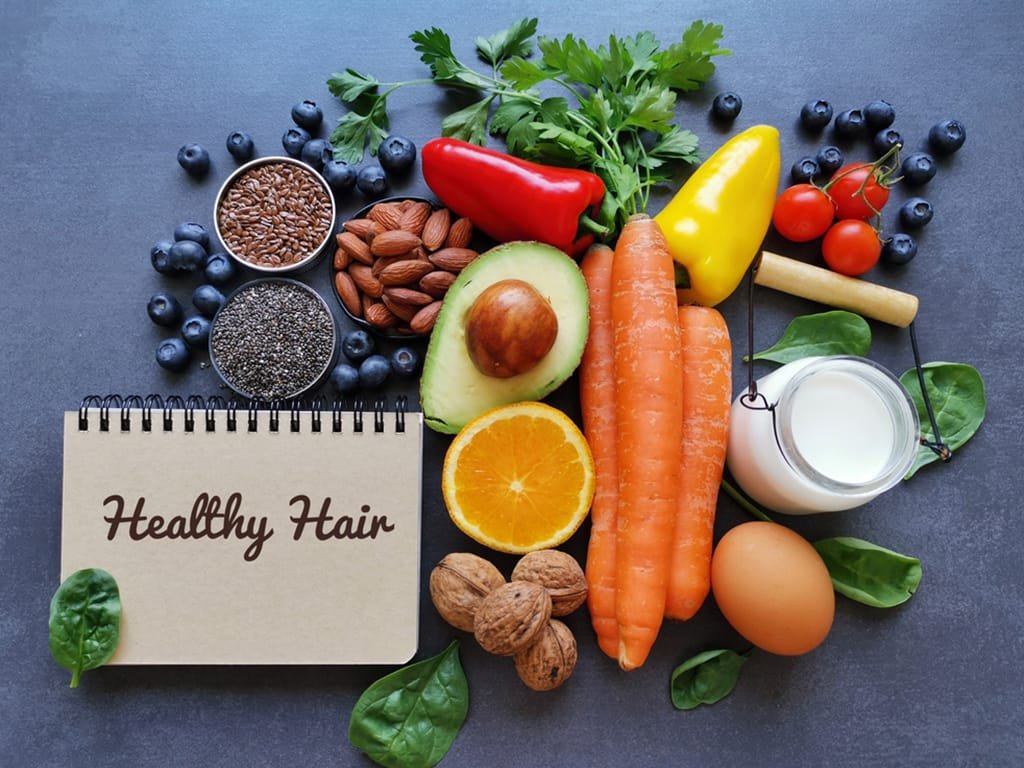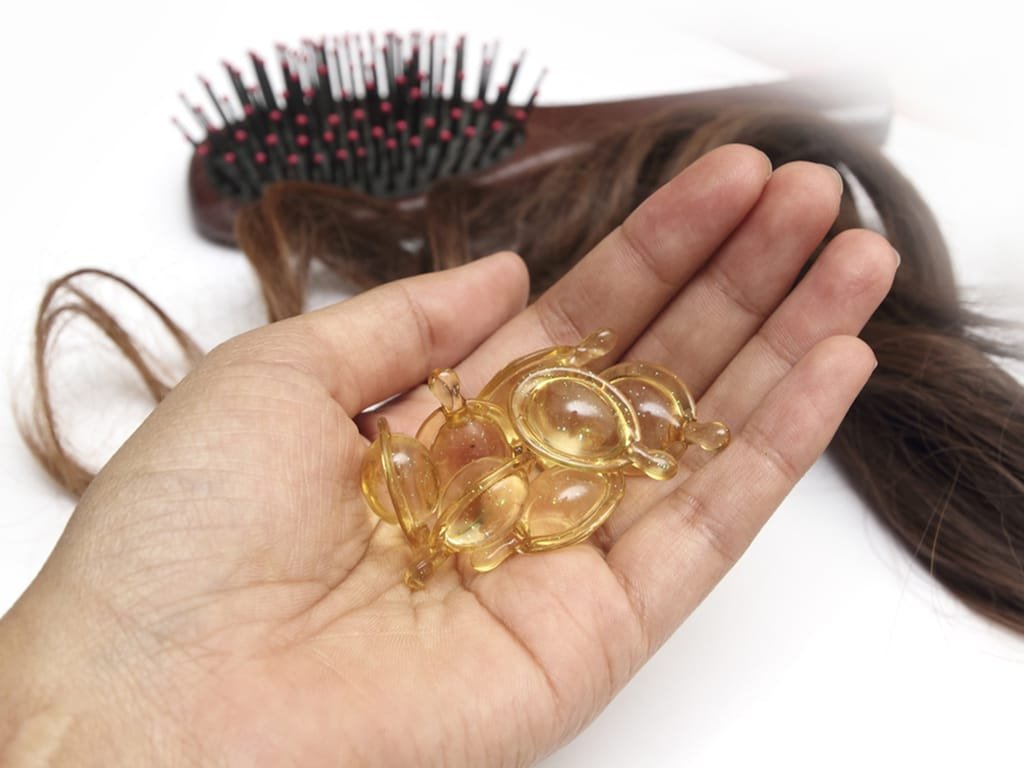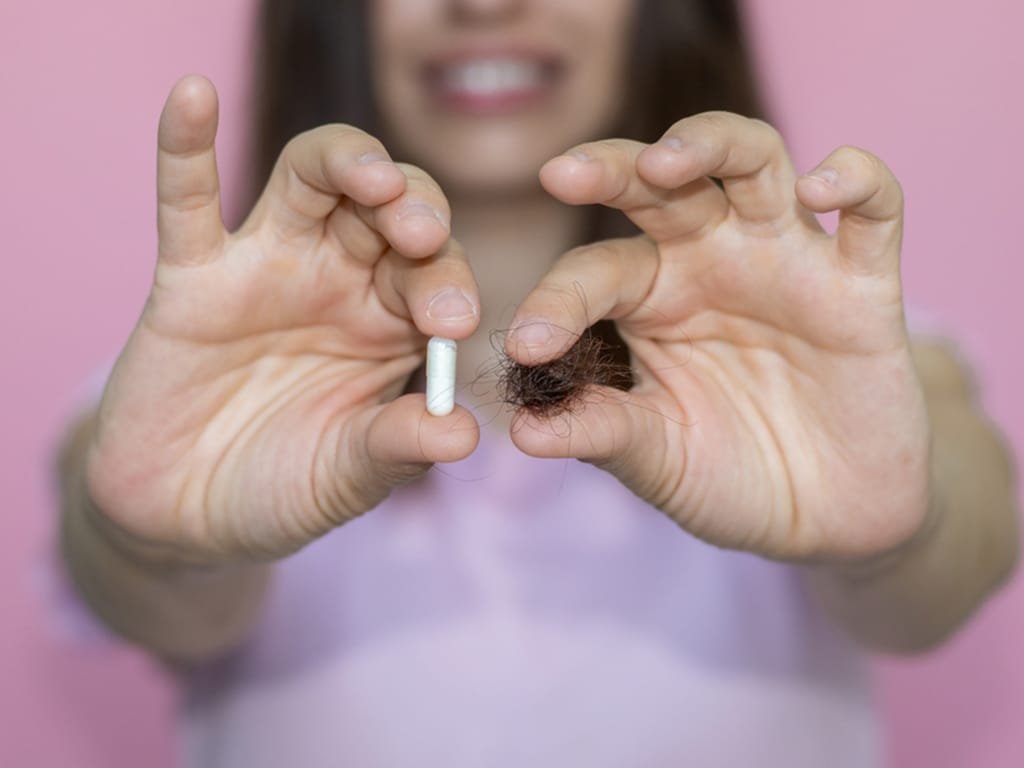The Best Fluffy Pancakes recipe you will fall in love with. Full of tips and tricks to help you make the best pancakes.
The Role of Vitamin D Deficiency and Hair Loss: Causes and Solutions
Have you noticed more hair in your brush or shower drain lately? Hair loss can be an unsettling experience, and for many, the cause can feel like a mystery. But what if the answer lies in something as simple and overlooked as a vitamin deficiency? Could low levels of vitamin D affect your hair’s health and growth?
Table of Contents
ToggleThis blog will look at the interesting link between vitamin D deficiency and hair loss. Vitamin D, known as the “sunshine vitamin,” is vital for many body functions. It’s especially important for hair follicle health. Not getting enough of this nutrient can lead to thinning hair and slow regrowth. We’ll also look at why this deficiency happens and practical ways to fix it. This guide helps you restore your hair’s vitality or prevent future loss. It gives you the knowledge to make smart choices. Let’s uncover the science behind the link and discover effective solutions together!

- Vitamin D is key for hair health and preventing loss.
- Low vitamin D can weaken hair follicles, leading to loss.
- Knowing your vitamin D levels is vital for hair growth.
- Eating right and getting sun can boost vitamin D.
- Good hair care can also help with vitamin D-related hair issues.
- Supplements might help if diet and sunlight aren’t enough.
Vitamin D: What You Need to Know Deficiency Cause Hair Loss
Vitamin D is key for your health. It helps your body absorb calcium and keeps your immune system strong. Without enough, you might face problems like weak bones and hair loss.
What is Vitamin D?
Vitamin D is made when your skin meets sunlight. It’s called the “sunshine vitamin.” You can also get it from food. This vitamin helps your bones and teeth stay strong and supports your immune system and mood.
Sources of Vitamin D
There are many ways to get vitamin D enough:
- Sunlight: Just a few minutes outside a few times a week can boost your ‘vitamin D levels’.
- Fortified Foods: Foods like milk, orange juice, and cereals are often fortified with vitamin D.
- Fatty Fish: Salmon, mackerel, and sardines are great sources of vitamin D.
- Supplements: If it’s hard to get enough sunlight and food, supplements like vitamin D3 can help.
Adding these vitamin D sources to your life can greatly improve your health.
What is Vitamin D Deficiency Cause of Hair Loss?
Vitamin D deficiency happens when your body doesn’t get ‘enough vitamin D’. This vitamin is key for bone health and keeping your immune system strong. Knowing the signs of a deficiency is important, as it can affect your health.
How Deficiency is Diagnosed
To find out if you have a ‘vitamin D deficiency’, a simple blood test is used. It checks the levels of 25-hydroxyvitamin D in your blood. Doctors often suggest this test to see if you have ‘enough vitamin D’.
If the test shows low levels, it means you have a deficiency. In this case, you might need to take action to get more vitamin D.
Common Symptoms of Vitamin D Deficiency
Knowing the signs of ‘vitamin D deficiency’ is vital for your health. Some common symptoms include:
- Fatigue
- Muscle weakness
- Bone pain
- Hair loss
If you notice these symptoms, seeing a doctor is a must. They can help figure out if you have a deficiency and what to do about it. Catching a deficiency early can help you feel better faster.
The Connection Between Vitamin D Levels and Hair Health
Understanding the link between vitamin D and hair health is key. It shows how important vitamin D is for healthy hair follicles. It helps your hair grow well, which is important for preventing hair loss.
How Vitamin D Supports Hair Follicles
Vitamin D is vital for hair follicle health. It helps cells in these follicles grow and change. When you have enough vitamin D, your ‘hair follicles’ work better, helping your hair stay healthy and strong.
Vitamin D and Hair Growth Cycle
The hair growth cycle has three phases: growth, transitional, and resting. Vitamin D helps the growth phase, making hair grow longer and stronger. Without ‘enough vitamin D’, ‘hair follicles’ may stop growing too soon, leading to hair loss. So, it’s important to have ‘enough vitamin D’ for healthy hair growth.

Vitamin D Deficiency and Hair Loss: Causes and Effects
Understanding ‘vitamin D deficiency‘ is key for those worried about hair loss. Low vitamin D can harm ‘hair follicles’, leading to shedding. This section explains how not ‘enough vitamin D’ can affect your hair.
Impact of Low Vitamin D Levels on Hair Follicles
‘Hair follicles’ are vital for hair growth. Low vitamin D weakens these follicles. Studies show vitamin D is important for hair growth and maintenance.
A lack of vitamin D can stop keratinocytes from growing. These cells make up the hair shaft. This can harm ‘hair follicles’, causing thinning and loss.
How Deficiency May Contribute to Hair Loss
The link between vitamin D deficiency and hair loss is well-known. Low vitamin D changes the hair growth cycle, affecting the telogen phase. This is when hair naturally sheds.
‘Vitamin D deficiency’ can make hair fall out too soon. This affects hair volume and texture, changing how it looks.
Types of Hair Loss Linked to Vitamin D Deficiency
Vitamin D deficiency can cause various types of hair loss. Female pattern hair loss is a common one in women. This section looks at how vitamin D affects hair loss. It shows why having “enough vitamin D” is key for hair health.
Female Pattern Hair Loss
Female pattern hair loss, or androgenetic alopecia, causes hair to thin gradually on the scalp. Studies link low vitamin D to this hair loss by impacting hair growth and follicle health. Women with this issue may see more hair falling out, making it important to spot the problem early.
Other Types of Hair Loss
‘Vitamin D deficiency’ is also tied to other hair loss types. Some include:
- Alopecia areata: This is a sudden hair loss in patches, often tied to autoimmune diseases.
- Telogen effluvium: This happens when stress, hormonal shifts, or other factors cause ‘hair follicles’ to rest, leading to shedding.
Fixing ‘vitamin D deficiency’ might help those with these hair loss types. Knowing how vitamin D and hair loss are connected helps in choosing the right hair care.
Identifying Your Vitamin D Levels
Knowing your ‘vitamin D levels’ is key for good health and fighting hair loss. To check your levels, follow these steps for testing and understanding your results.
How to Get Tested for Vitamin D Deficiency
Start by talking to a healthcare provider. They will suggest a blood test to measure your 25-hydroxyvitamin D level. This test shows your ‘vitamin D levels’ in your body. It’s easy to get tested and just needs a small blood sample.
The test is common and should be considered if you have symptoms of low vitamin D.
Interpreting Your Vitamin D Levels
When you get your test results, it’s important to know what they mean. ‘Vitamin D levels’ are divided into categories:
| Category | Vitamin D Level (ng/mL) |
|---|---|
| Deficient | Below 20 ng/mL |
| Insufficient | 20-29 ng/mL |
| Sufficient | 30-100 ng/mL |
| Potentially Toxic | Above 100 ng/mL |
If your levels are low, talk to your healthcare provider about supplements. Understanding your ‘vitamin D levels’ helps you make better health choices.

Strategies for Improving Vitamin D Levels
Boosting your ‘vitamin D levels’ is key to good health, including healthy hair. There are effective ways to do this. We’ll look at what to eat, how much vitamin sun to get, and when to consider supplements.
Dietary Recommendations
Eating foods rich in vitamin D is important. Look for natural sources. Include:
- Fatty fish such as salmon, mackerel, and tuna
- Cod liver oil
- Egg yolks
- Fortified foods, including milk, orange juice, and cereals
- Mushrooms exposed to UV light
These foods can help you get enough vitamin D and improve your diet.
Sun Exposure Guidelines
Getting some sun is a natural way to increase vitamin D. Here are some tips:
- Get 10 to 30 minutes of sun, based on your skin and where you live.
- Best to get sun during the middle of the day when it’s strongest.
- Don’t use sunscreen for short sun times to help make vitamin D.
- But don’t stay out too long to avoid skin damage.
Following these tips can help your body make more vitamin D naturally.
Consideration of Vitamin D Supplements
Even with diet and sun, you might need more vitamin D. A supplement can help. Talk to your doctor about the right amount for you. Look at:
- Vitamin D2 (ergocalciferol)
- Vitamin D3 (cholecalciferol)
Both can work, but D3 is often seen as stronger. Taking a supplement regularly can keep your ‘vitamin D levels’ up.
How to Combat Hair Loss Associated with Vitamin D Deficiency
To fight hair loss linked to ‘vitamin D deficiency’, you need a few steps. Start by taking good care of your hair and eating the right foods. Knowing how these actions help your hair can really make a difference.
Proper Hair Care Practices
Good hair care is key to healthy hair. Here are some tips:
- Avoid using too much heat styling, as it can harm your hair and cause more loss.
- Wash your hair gently with shampoos without sulfates to avoid irritation.
- Try to limit chemical treatments like dyes and relaxers, as they can weaken your hair.
- Use a wide-tooth comb to detangle wet hair and reduce breakage.
- Using a silk pillowcase can help prevent hair breakage from friction.
Nutrients for Healthy Hair
Eating the right foods is also important for healthy hair. Make sure to get enough of:
- Vitamin D: It helps your ‘hair follicles’ cycle and reduces loss.
- Biotin: It makes your hair stronger and thicker.
- Omega-3 Fatty Acids: They’re good for your scalp health.
- Iron: It boosts blood flow, bringing oxygen to your ‘hair follicles’.
- Zinc: It’s key for hair growth and repair.
By following these tips and eating the right foods, you can fight hair loss from ‘vitamin D deficiency’. This will also make your hair healthier and more vibrant, boosting your confidence.
| Nutrient | Role in Hair Health | Sources |
|---|---|---|
| Vitamin D | Regulates ‘hair follicle’ cycling | Sunlight, fortified foods, fatty fish |
| Biotin | Strengthens hair | Nuts, eggs, whole grains |
| Omega-3 Fatty Acids | Maintains scalp health | Fish, flaxseeds, walnuts |
| Iron | Improves circulation to hair follicles | Red meat, spinach, beans |
| Zinc | Assists in hair tissue repair | Shellfish, whole grains, legumes |
Vitamin D and Hair Regrowth Solutions
Fixing hair regrowth needs a full plan, mainly if vitamin D is low. Looking into good supplements and home fixes can really help. Here are some top ways to boost hair growth and scalp health.
Top Supplements for Hair Growth
Picking the right supplements can greatly help your hair health journey. Key ones include:
- Vitamin D3: This vitamin helps your body absorb calcium. It also keeps hair follicles healthy, which is important for growth.
- Biotin: Biotin is vital for making keratin, which keeps hair strong and healthy.
- Vitamin E: Vitamin E is an antioxidant that boosts blood flow to the scalp, helping hair grow.
- Omega-3 Fatty Acids: These fats feed ‘hair follicles’ and make hair thicker.
Home Remedies for Fortified Hair Health
Adding home remedies to your routine can help grow hair. Here are some good ones:
- Massage with Castor Oil: Castor oil on the scalp can wake up follicles and increase blood flow.
- Aloe Vera Treatment: Aloe vera moisturizes and calms the scalp, helping hair grow.
- Green Tea Rinse: Green tea’s antioxidants can make the scalp healthier and encourage new hair.
- Coconut Oil Infusion: Coconut oil is full of nutrients that feed hair and stop protein loss, important for growth.
Using these supplements and home remedies can help fight vitamin D deficiency can cause hair loss. They support your hair growth journey.
Long-Term Benefits of Adequate Vitamin D Levels
Keeping vitamin D levels up offers many long-term benefits. It’s not just for your hair. This important nutrient helps your overall health, affecting many parts of your life.
Overall Health Benefits
Vitamin D is key for many health functions. It:
- Boosts your immune system, keeping you healthy.
- Helps your mood, reducing depression risk.
- Strengthens bones, lowering fracture and osteoporosis chances.
These benefits show how vital vitamin D is for a balanced life. It helps you feel your best every day.
Impacts on Hair Growth and Appearance
Vitamin D is also vital for hair health. It:
- Makes ‘hair follicles’ stronger, possibly increasing hair density.
- Improves hair growth cycles, reducing thinning.
- Gives you a brighter look, showing your body’s health.
By focusing on vitamin D, your hair benefits too. You’ll see healthier growth and a better appearance, showing your dedication to wellness.

Conclusion
Researchers may link vitamin D deficiency to hair loss in many ways. Knowing how vitamin D affects your health and hair can help find better solutions. Vitamin D is key for healthy hair follicles and supports hair growth.
To keep your vitamin D levels up, get enough sunlight. Also, eat the right foods. If needed, use supplements. These steps help your hair stay healthy and boost your overall health. By watching your health and hair care, you can fight the bad effects of low vitamin D.
Putting vitamin D first is a big step toward having thicker, healthier hair. By making smart choices and putting in regular effort, you can keep your hair healthy. This will give you long-lasting benefits.
To keep your ‘vitamin D levels’ right, make sure to get enough sunlight, eat the right foods, and use supplements if needed. These steps help your hair stay healthy and boost your overall health. By watching your health and hair care, you can fight the bad effects of low vitamin D.
Putting vitamin D first is a big step towards having thicker, healthier hair. With regular effort and smart choices, you can manage your hair health and achieve lasting benefits.
FAQ
What is the relationship between vitamin D deficiency and hair loss?
Vitamin D is key for hair growth. Low levels can weaken ‘hair follicles’. This can lead to shedding and slow hair regrowth.
How can I increase my ‘vitamin D levels’?
Eat foods rich in vitamin D like fatty fish and fortified dairy. Safe sun exposure also helps. If needed, consider vitamin D supplements.
What are the common symptoms of vitamin D deficiency?
Signs include fatigue, muscle weakness, and bone pain. Hair loss is also common. If you think you’re deficient, see a doctor.
How is vitamin D deficiency diagnosed?
A blood test checks 25-hydroxyvitamin D levels’. Your doctor will tell you if your levels are low.
What types of hair loss are related to low ‘vitamin D levels’?
Low vitamin D can cause female pattern hair loss and vitamin alopecia areata. It’s also linked to telogen effluvium. Vitamin D is vital for ‘hair follicles’.
Are there specific vitamins and minerals that promote healthy hair?
Yes, vitamins like D, vitamin b12, biotin, zinc, and iron are good for hair. Eating a balanced diet with these nutrients helps hair grow.
What are some effective hair regrowth solutions for those with vitamin D deficiency?
Solutions include vitamin D supplements and proper hair care. Topical treatments can also help stimulate hair growth.
How often should I get tested for ‘vitamin D levels’?
Testing frequency depends on your age, health, and lifestyle. Talk to your doctor about how often to test your levels.



